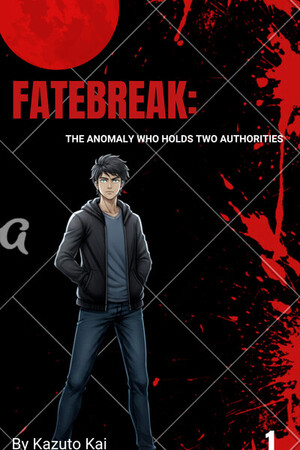Chapter 6:
To Witness One's Own Grave
Vagrants of Aeridor Valeria
The city was unnervingly still, its streets a barren landscape devoid of both pedestrians and vehicles. Perhaps it was the ominous storm clouds amassing overhead, their dark, swollen bellies promising a torrent. While it was understandable for people to take cover from an impending downpour, the utter lack of traffic was disquieting.
A fifteen-minute, full-tilt sprint brought me to the cemetery gates, leaving me gasping for air, my skin flushed with an unnatural heat. The deluge had begun midway through my run, a cold, relentless sheet of water that did nothing to extinguish the strange fever simmering beneath my flesh. I was shirtless, clad only in my rain-drenched delivery jeans.
I scaled the nearest wall to gain a vantage point from which I could locate Boss Ren. Though not exceptionally large, the cemetery was a sprawling labyrinth of ancient trees, rolling knolls, weeping stone angels, and imposing tombstones. The driving rain further veiled the scene, rendering the landscape in washes of gray and deep shadow. Spotting a small gathering of figures near the cemetery’s heart, I chose to keep my distance, taking refuge behind the massive trunk of a gnarled oak on a small, wooded rise at the edge of the grounds. From this perch, I had an unobstructed view of the gravestones below.
A congregation of men dressed in stark black suits stood before a single, freshly excavated grave. A closer look confirmed my terrible suspicion: Boss Ren was positioned at its head, his posture unyieldingly rigid. The others maintained a deferential distance of five meters. The very presence of these men, their bearing as severe and formal as federal agents, cemented the horrifying conclusion taking root in the pit of my stomach.
To my knowledge, Boss Ren had no family interred here. There was only one conceivable reason they would all be present, surrounding him, at this very moment.
That grave was intended for me. For his supposed son. I was meant to be lying in it—cold, lifeless, and likely mutilated beyond all recognition. Men of this caliber would not be in attendance for a stand-in or a counterfeit corpse. Their presence was the ultimate, irrefutable verification.
Words abandoned me. So… I truly had died. I was dead. But if that were true, what was I now? A phantom? A ghost? No, that couldn’t be right. I had just been speaking with Crazy Mo. I could touch things, feel the coarse bark of the oak against my back. I was solid. I was… alive.
Then what did that make me? The living dead? Some kind of monster?
Soaked by the frigid rain, I stood alone, my thoughts a chaotic vortex and my heart a hollow chasm. What was I supposed to do? Stride over there and declare my survival to Boss Ren? The exhaustion and the peculiar, internal fire from my run were intensifying, spreading through me like a venom. How could I possibly explain any of this? ‘Hey, Boss, turns out I died, got summoned to another dimension, and now I’m back.’ He knew about the lives I had extinguished, about my dark and brutal past. He knew I was partially responsible for the tragedy that had cost him his family, his home, his sight—his entire world. And yet, he had still taken me under his wing. He was a truly decent man, and for that, I held him in reverence.
I could only stare into the gray expanse as a crushing weight descended upon me, accompanied by an unbearable surge of heat. A scream ripped from my throat, silent to all but myself. It felt as if I were being incinerated from the inside out, a human pyre in the pouring rain. My thoughts fractured into splinters. Black smoke and steam hissed from my skin, like water striking a red-hot anvil. A web of incandescent crimson cracks began to fissure across my chest.
A profound weakness washed over me. What was happening? Within moments, the smoke billowing from my body thickened, the internal conflagration roared hotter, and the air filled with the audible sizzle of cooking flesh. The crimson fractures spiderwebbed outward, racing across my torso, down my arms, and up toward my neck. It was a singular agony, the sensation of being simultaneously scorched and flayed alive. The light emanating from the cracks grew so brilliant that, even from my distant position, the men standing behind Boss Ren finally noticed me.
I was nearly engulfed in a shroud of my own smoke. The pain crested, escalating so sharply that a guttural roar of pure torment ripped from my lungs. My consciousness began to fray at the seams. Am I dying again? This time, the agony was a thousand times more excruciating, and I had no name for my executioner.
And then, as abruptly as it had begun, the pain ceased. I plunged into darkness.
When I regained awareness, I was lying on the cot in my dungeon cell. I remained motionless for a long moment, allowing the fragmented pieces of my consciousness to reassemble.
Oh. So it was all just a nightmare. The build-up, the revelation, the torment—all a fabrication of my sleeping mind. I sat up, clutching my head, which still ached with the phantom pains of the hyper-realistic dream. It was the most vivid I had ever experienced; a film of cold sweat covered my body, a testament to how utterly real it had felt.
Phew. I released a long, slow breath. What a truly bizarre dream. My relief, however, proved to be fleeting. A glance downward confirmed that I was shirtless again, and my recently calmed thoughts scattered once more. The little princess had already seen me in this state, of course, but that hadn’t prevented her from branding me a ‘wicked nudist’ when she had discovered me earlier. I still had no idea what had become of my shirt. Had that been part of the dream as well?
Meanwhile, at a military installation somewhere in the FSA, at approximately the same time…
In a sterile conference room, a senior commander, his uniform heavy with medals, sighed as he stared at the report on the table. Dozens of other high-ranking military officials sat around the polished mahogany, their gazes locked on him, a palpable tension thickening the air as they awaited his orders.
One of the younger officers, clearly not privy to the situation, leaned toward his superior and whispered, “What’s going on? The commander looks like he’s seen a ghost.”
The report in the young man’s own hands seemed innocuous—a simple confirmation that a certain individual had been sighted alive. He could only infer that this ‘individual’ must be of monumental importance to warrant such a grave assembly.
“You’re not cleared for this,” his superior murmured back, his eyes never straying from the commander. “Just wait. The old man is about to brief the room. Pay attention. This matter is bigger than the Sovereign Code.”
The young officer’s eyes widened. Bigger than the President’s personal security protocols? “A national threat?” he mouthed silently.
“That’s right. And depending on how this unfolds, potentially a global one.”
“A global threat? We haven’t faced one of those since the Cold War.”
“Yes, we have,” the superior corrected grimly. “For the last fifteen years. Now be quiet and listen.”
A moment later, the commander cleared his throat, his voice low and solemn, commanding immediate silence. “Gentlemen, thank you for assembling on such short notice.”
“Two hours ago, we received a report. A man we believed to be deceased—a man whose death we personally verified—may, in fact, be alive.”
A collective shifting of bodies was the only sound as everyone leaned forward.
“This is a man who possesses enough leverage to collapse the entire Western Hemisphere,” the commander continued. “He holds compromising intelligence on our nation, on every foreign superpower, and on nearly every clandestine organization known to exist. To put it bluntly, this man single-handedly holds the keys to igniting a new world war.”
A sharp, unified gasp came from the uninitiated in the room.
Unable to suppress his disbelief, one officer spoke up. “A man like that exists? And he’s hostile? Where did he come from? Is he Umbra Mortalis?”
“No,” the commander replied, his expression hardening. “He was one of ours. More accurately, he was our creation.”
“One of us? So, just a simple rogue agent.”
“He is far more than a rogue agent, Kestor,” the commander said, his gaze briefly landing on the young officer. “He was a participant in an experimental program to engineer the perfect operative. We found him in a maximum-security penitentiary. He was ten years old.”
“Wait, sir. How does a ten-year-old end up in prison?”
“For a typical offense, they do not. But his crime was anything but typical. Our records indicate his parents were murdered by local street thugs. A few weeks later, the boy vanished for several days. I think you can surmise what he did.”
“Don’t tell me a ten-year-old took out an entire gang of hardened criminals by himself.”
Kestor visibly relaxed. “No, he did not.” The commander let the silence hang for a beat before continuing. “He dismantled their entire organization, along with a rival outfit from the adjacent territory. The final body count was eighty-nine. He was the sole perpetrator.”
A stunned silence descended upon the younger staff. “That’s impossible! How?”
“That is when he appeared on our radar. It wasn’t brute strength he employed, but cold, calculated genius—a level of strategic thinking no child should possess. He fed disinformation to both gangs, luring them into the same building under the pretense of a summit. While they were busy slaughtering one another, he sealed the exits and set the structure ablaze, having already prepared secondary traps to eliminate any potential survivors. When he was apprehended days later while continuing his vigilante crusade, he was deemed psychologically unstable. He was also the perfect candidate for our project, so we took him in.”
“So we recruited him, trained him to be a super-agent, and he went rogue?”
“He wasn’t just a super-agent. He was the apex predator of the program. The boy, Rylan Maxton, became the man, codenamed Axel—a ruthlessly efficient, emotionless killing machine. During an augmentation procedure, a device malfunctioned, sending a lethal electrical current through dozens of subjects. He was the only survivor. The doctors who treated him called him ‘as tenacious as a cockroach.’”
Kestor swallowed hard, deciding it was best to cease making assumptions.
“Out of more than one hundred candidates, he was one of only five to survive the training regimen. By fourteen, he was the perfect operative. We had high hopes, but it all unraveled in less than a year. He escaped our facility, hacked our highest-level criminal database, and disappeared. Our research had shown that the gangs he had dismantled as a boy were merely a minor branch of a vast international network. So he embarked on a one-man crusade, escalating his war on crime. Every attempt we made to intercept him resulted in humiliating failure. The situation worsened when he learned of the government’s… unofficial arrangements with certain criminal syndicates. He discovered the uncomfortable truth that, like most nations, we permit certain organizations to exist to manage the more unsavory elements of society. The underworld and the government—two sides of the same coin.”
The commander paused, letting the weight of his words settle. “Over the next decade, he systematically dismantled countless criminal empires and corrupt political regimes, all while accumulating a treasure trove of blackmail material on virtually everyone of consequence. Fearing the power he wielded, we redoubled our efforts to capture him. And, as usual, we failed. Then, one day, he emerged from the shadows of his own volition, with a single message: a warning of an imminent, large-scale terrorist attack on our soil and an instruction to lock down our airspace.”
A shadow of profound regret crossed the commander’s face. “We ignored him. We saw it as an opportunity to finally apprehend him and focused our resources accordingly. The result… was the 9/11 catastrophe. A national tragedy we will carry to our graves. We could have prevented it. While we were failing, he was succeeding. He stopped the fifth plane.”
“The fifth plane, sir?” Kestor asked, his confusion evident. “The official record states there were only four.”
“That is the public narrative. The truth is, a fifth plane was targeting the White House. Axel single-handedly prevented its hijacking.”
A palpable chill moved through the room. Even for those who knew the story, the memory was a raw, exposed nerve.
“After that day, we pulled back,” the commander continued. “We monitored from a distance, but we ceased all active interference. It was the least we could do—a tacit admission of our debt, and perhaps a gamble that he bore no true malice toward his home country. He also,” the commander added, his voice dropping lower, “prevented Choson from initiating nuclear war.”
The shock from the younger officers was even more profound this time.
“The man personally thwarted the launch of nuclear-armed ballistic missiles aimed at its neighbors. The operation was a success, though not without significant collateral damage. The warheads detonated deep within the Vast Sea, far from any population centers. However, the resulting seismic event ruptured a tectonic plate, triggering the tsunami that devastated the Xendai region of Nihon a few years back.”
“To think… that something of that scale was covered up… Is that even possible?” another young man muttered.
“Why do you think Choson remained silent when that comedy mocking their great leader was released? It was funded by a Nihon-based shell corporation. That was Axel’s passive-aggressive form of retaliation. His accomplishments are legion. In ten years, he amassed so much power he no longer needed to hide. His enemies operated under an unwritten rule of mutually assured destruction: if Axel were ever killed, his network of associates had standing orders to release every secret he had ever collected. So they left him alone. He stopped his crusade and began to live a quiet life.”
Kestor’s jaw was practically on the table. “An incredible story, sir. But if he retired, why is he a threat now?”
“Because, according to this report, he died nearly a week ago. We confirmed it—a bizarre industrial accident. The entire global intelligence community was stunned. With him gone, the race was on to find the device containing his data. We could not find it. We turned the city of Brookland upside down, interrogated his known associates, and tore apart every location he frequented. Nothing. Global tensions spiked as governments began pointing fingers. Then, this afternoon, we received a new report. Rylan Maxton is alive. He was spotted in the very same city by an operative assigned to one of his contacts. We have footage.”
An assistant dimmed the lights, and a video flickered to life on the main screen. The footage was brief, captured from the first-person perspective of a camera hidden in a pair of glasses. In the lower-right corner of the frame, a hand gripping a pistol was visible. Despite the torrential rain, the image was clear enough to show a man in the distance, wreathed in an unnatural black smoke. The operative zoomed in, revealing a shirtless, scarred man whose face, though partially obscured, was a match for the file on Rylan Maxton. Then, something impossible occurred. Blazing red fissures erupted across his skin, growing in intensity until his eyes glowed with the same crimson light. A few seconds later, a blinding flash of white light bleached the camera's sensor. When the feed recalibrated, he was gone. Nothing remained but the wind and the rain.
The lights came up, revealing a room of shell-shocked faces.
“Gentlemen,” the commander said, his voice like granite. “Mark my words. This is a man who has cheated death time and again. His ‘death’ last week was a test. A brilliant, terrifying feint to see how his enemies would react. I do not know how he faked it—a clone, a perfect body double—but he fooled us all. This is a man who would orchestrate his own demise just to watch the fallout. His reappearance means the test is over, his objective is met, and he is preparing his next move. We are now at our highest state of alert. I want defense contingencies drawn up immediately. Expand our surveillance network. Under no circumstances are any personnel to engage the target. And expect the unexpected. As you have just witnessed, this man operates outside the known laws of physics.”
After the briefing concluded, the room erupted into urgent, strategic debate.
Meanwhile, in a dungeon cell in another universe, a certain man was lying on his side.
Tsk, tsk, tsk.
“Aaaah, yeah, that’s the spot. Keep scratching.”
The very man who had the most powerful military leaders on the planet scrambling in a state of panic was, at that exact moment, reveling in the simple, primitive pleasure of a good back-scratching. If they could see him now, they would surely believe they were hallucinating. They had constructed a myth, a grotesque monster to be feared, and had completely missed the easygoing man at its core. In its own way, that simple truth was perhaps more world-shattering than the fact that he had single-handedly averted nuclear war.




Please sign in to leave a comment.